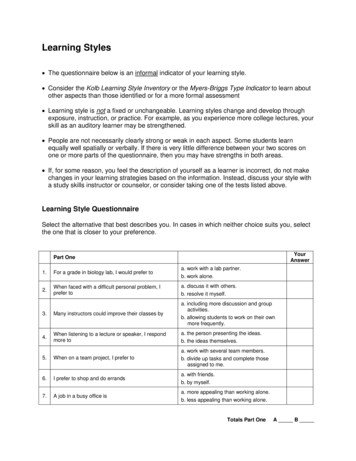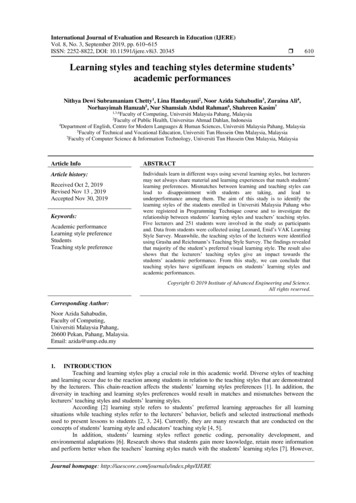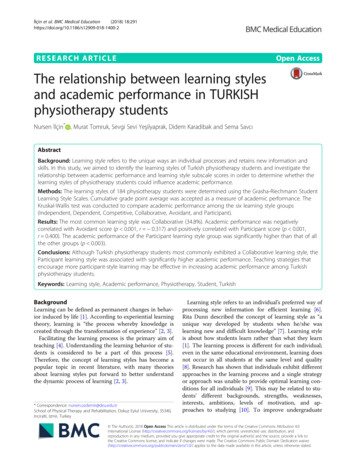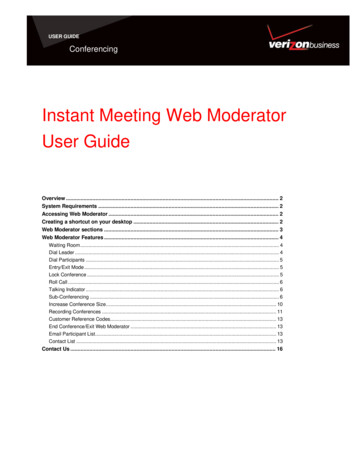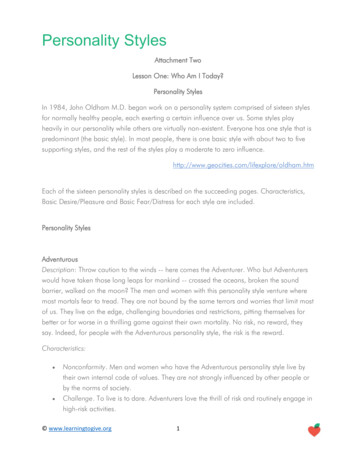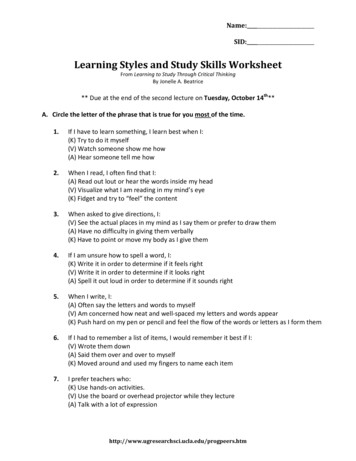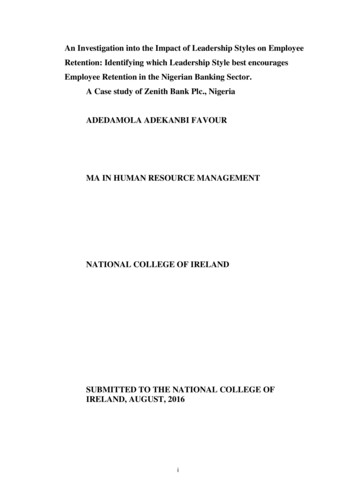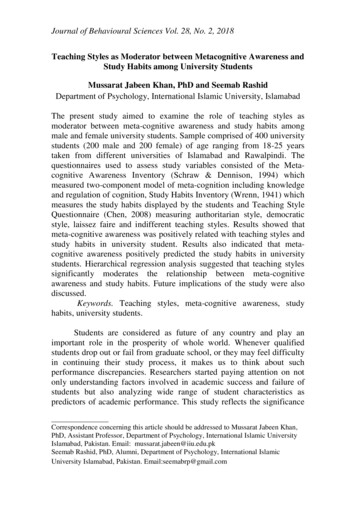
Transcription
Journal of Behavioural Sciences Vol. 28, No. 2, 2018Teaching Styles as Moderator between Metacognitive Awareness andStudy Habits among University StudentsMussarat Jabeen Khan, PhD and Seemab RashidDepartment of Psychology, International Islamic University, IslamabadThe present study aimed to examine the role of teaching styles asmoderator between meta-cognitive awareness and study habits amongmale and female university students. Sample comprised of 400 universitystudents (200 male and 200 female) of age ranging from 18-25 yearstaken from different universities of Islamabad and Rawalpindi. Thequestionnaires used to assess study variables consisted of the Metacognitive Awareness Inventory (Schraw & Dennison, 1994) whichmeasured two-component model of meta-cognition including knowledgeand regulation of cognition, Study Habits Inventory (Wrenn, 1941) whichmeasures the study habits displayed by the students and Teaching StyleQuestionnaire (Chen, 2008) measuring authoritarian style, democraticstyle, laissez faire and indifferent teaching styles. Results showed thatmeta-cognitive awareness was positively related with teaching styles andstudy habits in university student. Results also indicated that metacognitive awareness positively predicted the study habits in universitystudents. Hierarchical regression analysis suggested that teaching stylessignificantly moderates the relationship between meta-cognitiveawareness and study habits. Future implications of the study were alsodiscussed.Keywords. Teaching styles, meta-cognitive awareness, studyhabits, university students.Students are considered as future of any country and play animportant role in the prosperity of whole world. Whenever qualifiedstudents drop out or fail from graduate school, or they may feel difficultyin continuing their study process, it makes us to think about suchperformance discrepancies. Researchers started paying attention on notonly understanding factors involved in academic success and failure ofstudents but also analyzing wide range of student characteristics aspredictors of academic performance. This study reflects the significanceCorrespondence concerning this article should be addressed to Mussarat Jabeen Khan,PhD, Assistant Professor, Department of Psychology, International Islamic UniversityIslamabad, Pakistan. Email: mussarat.jabeen@iiu.edu.pkSeemab Rashid, PhD, Alumni, Department of Psychology, International IslamicUniversity Islamabad, Pakistan. Email:seemabrp@gmail.com
68KHAN AND RASHIDof various strategies in improving study habits of students. The ultimateaim of all educationists and educational institutions is to enhance hiddenpotential of all students and make their study process flexible andqualitative. There is a need to devise such teaching methodologies thatassists all students to learn and comprehend their subjects without anydifficulty. Therefore, this study helps not only in revealing effectivenessof intellective strategies in building productive study habits of studentsbut also proves to be significant in highlighting the contribution ofvarious teaching styles. No doubt, that there is a narrow range ofresearches available on teaching styles which are found to be as effectiveas students’ efforts in academic achievement.It is rather more surprising that under supervision of sameprofessors, same teaching system, same subjects, same time of the dayfor a specific course, why some students show good performance whileothers do not? What are those factors involved in bringing suchdifferences? and what is the best way to arrange study process so that allstudents learn and perform equally well according to schools’expectations (Cerna1 & Pavliushchenko, 2015). Moghadam andCheraghian (2009) found that study process of students is not in goodquality so there is a need to give emphasis on effectiveness of students’study process. Despite perceived importance of study habits to academicachievement; our educational institution pays little attention tounderstand these factors (Baquiran, 2011).Study habits mean the habits that an individual might havedeveloped with respect to his learning activities (Nagaraju, 2004).Habitual ways of exercising and practicing their abilities for learning aretermed as study habits of learners. Kholi (1977) suggested that studyhabits have particular theoretical and practical importance in theacademic field. Okpala, Okpala, and Ellis (2000) reported positiverelationship between good study habits and performance in economicscourse. It was also suggested that students’ study habits, skills, andattitudes, in turn, have positive effect on student grades (Crede & Kuncel,2008). Blake (1954) and Shaw (1955) reported that students showedmarked improvement in study habits as a consequence of training instudy skills. Pazhanivel (2004) conducted study on students of secondarylevel and found significant relationship between study habits andacademic achievement. So there is a need to discover finite treasurewithin every learner in order to improve effective study habits.During the last twenty years of cognitive research, it was foundthat meta-cognition is the critical component of the intellect (Boekaerts,
TEACHING STYLES, METACOGNITIVE AWARENESS, AND STUDY HABITS69Pintrich, & Zeidner, 2000; Mooney, 2002) as implementing andintegrating knowledge, inventiveness, and self monitoring are consideredas hallmarks of intelligent behavior. Meta-cognition is a term thatincludes reflective, constructive and regulated learning at all levels ofeducation and for students of different intellects. It is also referred tounderstanding and monitoring of one’s thoughts and tasks performance(Iiskala, Vauras, Lehtinen, & Salonen, 2011) or more simply thinkingabout one’s thinking (Efklides, 2006). It is found that low levels of metacognition and misaligned self evaluations are detrimental to effective selfmanaged learning which ultimately negatively affects individualperformance. On the other hand, high level of meta-cognition improvesindividual performance by allowing them not only to promote capabilitiesthey possess but also aware about those capabilities they do not posses(Baddareen, Ghaith, & Akoura, 2015). Unfortunately, students are notwell aware of such effective learning strategies due to which they facerepetitive failures. Therefore, we cannot neglect the role of teachers andinstructors in the study process of students. Basically teachers teachstudents how to select, monitor and utilize suitable strategies throughtheir own preferred teaching styles.According to Callahan, Clark, and Kellough (2002) teachers mustteach a wide variety of learning strategies to students and they have tomodify their teaching styles. Grasha (1996) defined teaching style interms of various elements that are well demonstrated by the teachers inevery teaching-learning moment- characteristics, beliefs, instructionalpractices, roles, and behavior. It was found that teaching styles as well asself efficacy of teachers had positive influence on students’ outcomes(Goldhaber, 2002; Good & Brophy, 2003). Teachers are not only reactorsto motivational patterns of their students which they had before enteringin their classrooms but also act as active socialization agents motivatingstudents to learn and achieve their goals (Brophy, 1986). Zeebs (2004)indicated that academic performance can be accelerated by the alignmentof students’ learning styles with the teacher’s teaching style. Numerousresearches show that teachers play an important role in bringing aboutstudent achievement in every educational setting (Alexander & Fuller,2005; Goldhaber, 2002; Sanders, 1998, 2000) but still there is a need toassess the effect of teaching styles on students’ learning strategies andstudy habits. Scrugs (1985) suggested that teachers can help students inthe cultivation of meta-cognitive strategies by directly teaching suchstrategies.
70KHAN AND RASHIDRationale of the StudyIt is quite evident from literature review that not only students’meta-cognitive strategies but also teachers’ teaching styles influenceacademic outcomes. However, research addressing influence of metacognitive strategies on study habits in the presence of teaching stylesremains limited. In fact, there are numerous researches related toeffectiveness of metacognitive strategies on academic achievement butlittle is known about simultaneous influence of metacognitive strategiesand teaching styles on study habits. Primary concern of all educationistsis to provide students undeniable reasons to be remained in schools,knowledge of cognitive science to boost their learning, and teachers whoare efficient enough in creating such learning environment which notonly open minds of students to think critically but also enables them to beparticipative members of society. In order to fulfill these objectives, thereis a need to investigate study process and learning environment ofstudents. Present study proves to be significant as it explores moderatingeffect of four teaching styles (authoritarian, democratic, laissez faire, andindifferent teaching style). Besides this, fewer researches evaluated thestudents’ perception of teaching styles (Chang, 2010; Munir & Rehman,2016) and how they influence their study habits. So this research studynot only expands knowledge of metacognition, teaching styles and studyhabits in existing literature but also suggests strategies to enhanceacademic performance of students.Objectives To study the relationship between metacognitive awareness andstudy habits in university students. To examine the moderating role of different teaching styles inrelationship between metacognitive awareness and study habits inuniversity studentsHypotheses Regulation and knowledge about meta-cognitive strategies arepositively related to study habits in university students. Perceived democratic, authoritarian, laissez faire, and Indifferentteaching style work as moderator between meta-cognitiveawareness and study habits in university students.
TEACHING STYLES, METACOGNITIVE AWARENESS, AND STUDY HABITS71MethodResearch DesignCross-sectional research design was used.SampleThe sample was comprised of 160 students (80 males and 80females) of age range 18 to 24 year (M 22, SD 3.08). The data wascollected from some colleges and universities of Islamabad andRawalpindi in Pakistan through convenient sampling technique.Assessment MeasuresMeta-cognitive Awareness Inventory (MAI). To measure metacognitive awareness strategies of students, meta-cognitive awarenessinventory MAI (Schraw & Dennison, 1994) was used. MAI consists of52 items rated on five point rating scale ranging from 1 (stronglydisagree) to 5 (strongly agree). High score reflects greater repertoire ofmeta-cognitive awareness strategies. It consisted of two maincomponents meta-cognitive knowledge and meta-cognitive regulation.Knowledge of cognition subscale consisted of 17 items with the highscore of 85 indicating high meta-cognitive knowledge having Cronbach'salpha reliability.76. Regulation of meta-cognitive knowledge subscaleconsists of 35 items where high score of 175 indicates greater control onmeta-cognitive knowledge having Cronbach's alpha reliability .80. Inpresent study the overall scale reported .88 of alpha reliability.Study Habits Inventory (SHI). Study Habits Inventory (Wrenn,1941) was used to determine study habits of students in different wayslike, to identify study weaknesses, to allow individual students to seeparticular study habits, for clinical study and individual counseling andfor students own information about their readiness for study. It consistsof 32 items rated on three point rating scale ranging from 1 (Rarely ornever true) to 3 (Often or always true). In present study this scalereported .91 of alpha reliability.Teaching Style Questionnaire (TCQ). Teaching StyleQuestionnaire is a 29-iteminstrument that assesses students’ perceptionsof their teachers’ teaching styles (Chen, 2008). The instrument is dividedinto four categories: democratic (11 items), authoritarian (9 items),laissez faire (5 items), and indifferent teaching styles (4 items). Each
72KHAN AND RASHIDcategory reflects one type of teacher behavior. Respondents answer itemsusing a 5-point scale ranging from “never” to “always”. The highestscore on a category indicates the most frequently perceived teachingstyle. The reliability coefficient was found to be .93. The reported alphavalues of each teaching style were democratic .78, authoritarian .80,laissez faire .80, and indifferent .79.ProcedureParticipants were approached after seeking approval from theirinstitutions. All participants of the study were informed about the purposeand significance of the study. They were assured that their responseswould be kept confidential and anonymous and used only for the purposeof research. Participants were handed over booklet of questionnairesincluding Meta-cognition Awareness Inventory (MAI), Study HabitsInventory (SHI) and Teaching Style Questionnaire (TSQ) in order toassess their level of meta-cognition knowledge and regulation abilities,study habits and learning strategies. Verbal instructions were alsoprovided to respondents along with written directions to respondquestionnaires. All statistical analyses were performed using StatisticalPackage for Social Sciences (SPSS 20.0) and results were reportedaccurately.ResultsPearson product moment correlation analysis was run to see therelationship between metacognitive awareness, teaching styles and studyhabits in university students (See Table 1).Table 1Relationship Between Meta-cognitive Awareness, Teaching Styles and Studyhabits in University Students (N 200)Variable234561. Meta-cognitive knowledge.72**.69*-.73** .78**-.757.81*2. Meta-cognitive Regulation3. Democratic teaching style4. Authoritarian teachingstyle5. Laissez faire teaching style6. Indifferent teaching style7. Study habits*p .05. **p .01.56**-.71*.85**-.71.73*-.79**.68*-.84.67*-.7
Questionnaire (Chen, 2008) measuring authoritarian style, democratic style, laissez faire and indifferent teaching styles. Results showed that meta-cognitive awareness was positively related with teaching styles and study habits in university student. Results also indicated that meta-cognitive awareness positively predicted the study habits in university students. Hierarchical regression .
